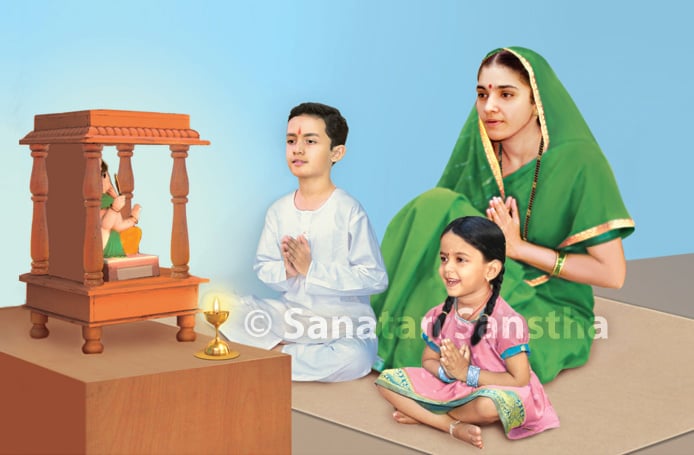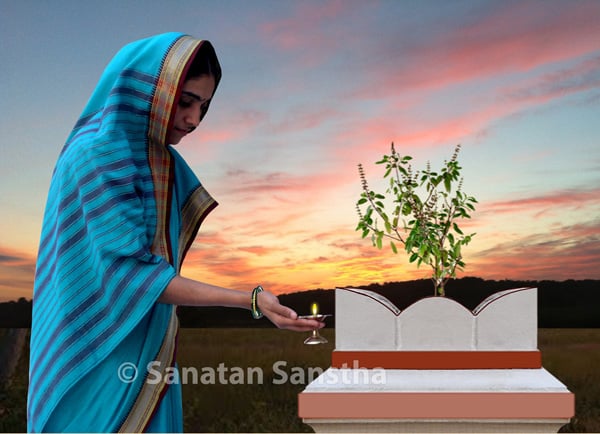Contents
- 1. Appropriate conducts to be observed during during transition period (Sandhikal)
- 2. Acts prohibited during the evening (Sandhikal)
- 3. Acts Prohibited at night
In the earlier times,the evening prayer ‘shubham karoti’ used to be recited at dusk after lighting lamps in the house; today’s children are engrossed in watching television instead.Truly, Hindus are drifting progressively from Āchārdharma (Code of Conduct) prescribed by the Hindu Dharma. Following this Āchārdharma is the foundation of Spirituality.
1. Appropriate conducts to be observed during during transition period (Sandhikal)
Definition of Sandhikal (Transition Period) : The duration of forty eight minutes (Two Ghatikas) before sunrise and after sunrise is called ‘sandhikal’. It is also called ‘Parvakal’.
Importance of observing achar in sandhikal : Since sandhikal is the period of arrival of negative energies, Dharma has attributed importance to observing achars during this period to ensure protection. During this period violent acts are prohibited.
1.1 Lighting dhoop (Frank incense) in the house in the evening
This purifies the vastu (premises), as well as the clothes of the people residing in the house.
1.2 At dusk, after lighting a lamp in the temple at home, offer obeisance to it
Perform sandhya at dusk and light a lamp in the temple at home. Then, light a lamp in the courtyard near the tulsi plant. The lamp lit as worship, should burn at all the twenty four hours. In the evening, clean the lampblack over the wick. If burning the lamp all day is not possible, it should be lit at least in the evening in the temple at home.
Science behind the achar of lighting a lamp near the tulsi plant and in the house at dusk
At dusk, lighting an oil lamp in the temple at home and near the tulsi plant creates a protective sheath of sattvik waves of the Deities around the house. This protects the people in the house from distressing vibrations generated from the activation of negative energies in the atmosphere. That is why, the scriptures recommend that we return home before dusk and do not leave the house thereafter. People may suffer from negative energy attacks at dusk. Worshippers of the Aghori (A sect which worships Deity Shiva) science gain control over the negative energies that enter the atmosphere of the earth at dusk, and get evil acts performed through them. That is why, this period is ‘the period of distress or destruction’
1.3 Recite Verses (Shloks) after lighting the lamp
After lighting the lamp, recite the following shlokas (Shlokas are usually part of stotras which are prayers to the Deities) :
शुभं करोति कल्याणं आरोग्यं धनसंपदाम् ।
शत्रुबुद्धिविनाशाय दीपज्योतिर्नमोऽस्तु ते ।।
Meaning: O flame of the lamp, you bestow auspiciousness and wellbeing, health and wealth. You also destroy the intellect of enemies. Therefore I pay obeisance to you.
दीपज्योति:परब्रह्म दीपज्योतिर्जनार्दन: ।
दीपो हरतु मे पापं दीपज्योतिर्नमोऽस्तु ते ।।
Meaning: Light emanating from the oil lamp is in fact, a form of Parabrahman (Supreme Brahman)
An oil lamp is Parameshwara (Supreme God), eliminating the sorrow in the world. O lamp, absolve me of sins. I offer obeisance to you.
B. Benefits of reciting shlokas
-
Shlokas like ‘शुभं करोति कल्याणं …’which glorify the Deity, perform the mission of repulsing negative energies.
-
Reciting of stotras (Holy Hymns) creates sattvik waves which purify the home, besides reducing negative energy problems.
-
Recitation of stotras after lighting the lamp helps children memorise better, purifies their speech and helps them pronounce words clearly.
C. After Reciting shlokas offer Arti (A ritual of waving a lit lamp in front of a Deity, accompanied by singing of hymns) to the Deities and then pray
2. Acts prohibited during the evening (Sandhikal)
Since the prevalence of negative energies during sandhikal is high, the following acts are prohibited :
-
Sleeping, eating, drinking and cooking
-
Commencing an auspicious act
-
Recitation of Vedic mantras
-
Gifting a white substance to another
-
Give and take of money
-
Crying
-
Embarking on a journey
-
Swearing, abusing, quarrelling, lying and indulging in inauspicious talk
-
Acts prohibited for a pregnant women
-
Standing in the doorway: This is harmful for the foetus.
-
Seeing cattle returning home in the evening: Spirits and ghosts try to enter the house through the legs of the cattle. That is why; pregnant women should never look at cattle returning home in the evening.
-
-
For Agnihotris
Agnihotris (Those who keep the sacred fire burning perpetually) kindle the fire before sandhikal, but light the hom (Fire-sacrifice performed to appease Deities) only after sandhikal.
-
At dusk, avoid sitting on the bank of a river other than the Ganga
River Ganga is also called ‘Gangotri’ (The one which provides a flow of sattvik waves laden with the Shiva Principle). Sattvik waves emitted by the waters of the Ganga purify the atmosphere on its banks and enrich it with Chaitanya (Divine Consciousness), thus reducing the possibility of being attacked by negative energies. As against this, sattvikta is comparatively less on the banks of other rivers. Due to the movement of negative energies there, chances of an individual being attacked by them are higher. Since the proportion of Pruthvi-tattva (Absolute Earth Principle) and Apa-tattva (Absolute Water Principle) is more in the inferior type of negative energies on the river banks, these can blend with the human body (composed of the Pruthvi-tattva and Apa-tattva) in a shorter time. That is why, unless inevitable, never sit or stroll on the banks of a river at dusk.
3. Acts Prohibited at night
1. Avoid looking at the mirror at night
(This is prohibited because a power full negative energy from the environment can instantly attack one’s mirror image ) Since the night is favorable for the circulation of Raja-Tama components, it is associated with subtle Raja-Tama movements and closeness with negative energies. Since a mirror image of an individual is more closely linked with subtle waves of the jiva (embodied soul), it can be attacked instantaneously by a powerful negative energy from the environment.
2. Avoid dancing or singing under the influence of alcohol
Dancing and singing after consuming alcohol during the night as entertainment, hobby or just to pass the time, increases the Tama component in a shorter time and there is a possibility of the individual suffering from severe distress due to negative energies. Besides, increase in the Tama component of an individual pollutes the surrounding atmosphere and that in the house.
Reference: Sanatan Sanstha’s Holy Text ‘Daily conduct and science underlying its Acts’




